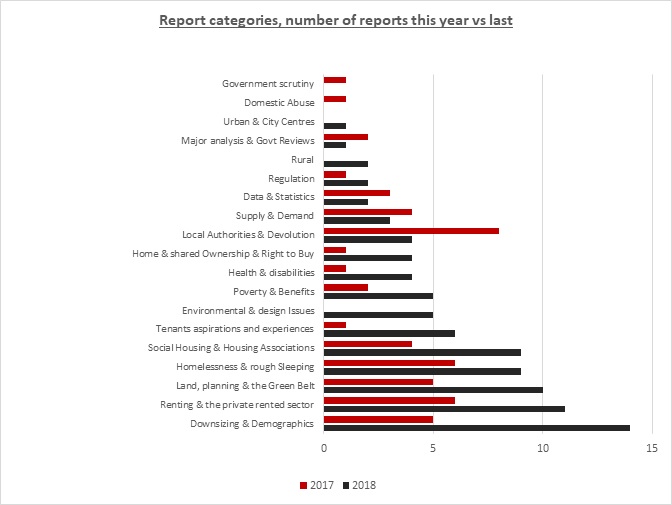You are viewing 1 of your 1 free articles
Thinkhouse: the must-read housing reports of 2018
More than 130 pieces of housing research were uploaded to the Thinkhouse website in 2018. Richard Hyde picks 12 of the best.
Thinkhouse is a new website set up to be repository of housing research. Its editorial panel of economists, chief executives, consultants and academics critiques and collates the best of the most recent housing research (scroll down for more information).
As 2018 draws to a close, it is time to nominate the most influential housing reports of the past 12 months.
This was a bumper year for housing research, with more than 130 reports uploaded and categorised in the first full year of our web library.
We know from the feedback we have received that our database of reports into how to build more and better homes and the related economic, social and community benefits of doing this is really helping link ideas to those that can use them to make a difference.
Our editorial panel has looked at all the reports and chosen those that we think have the greatest scope to influence decision-makers. This could be either for the quality of their research, innovation or the breadth of analysis.
This year we have selected 12 reports as must-reads and highly commended a further eight.
“Our editorial panel has looked at all the reports and chosen those that we think have the greatest scope to influence decision-makers.”
At the start of the year our editorial panel selected Ending Rough Sleeping: What Works? by Crisis. This well researched piece provided an international perspective on ending rough sleeping and asserted that current approaches to rough sleeping are not as effective as they might (and need) to be as they are not focused enough on prevention.
It highlighted the need for solutions to be housing-led, not least swift access to permanent housing without pre-conditions (‘Housing First’). With the National Audit Office and the Public Accounts Committee also examining homelessness and rough sleeping it widened the understanding among policymakers of the extent of (as described by MPs) our national homelessness crisis.
In February the Housing, Communities and Local Government Committee reported on its investigation into Housing for Older People.
One of the startling facts to emerge (from Housing LIN) is that there will be a shortfall of 400,000 units of purpose-built housing for older people and 200,000 care beds by 2035.
Our panel member Professor Ken Gibb highlighted in a review of the committee’s report that the evidence focused on key deficits in areas such as the adequacy and sufficiency of housing supply, repairs, maintenance, adaptations and access to financial advice. In turn, these sorts of problems require greater responsibility on planning and housing functions, developers, lenders and providers of information and advice.
Spring 2018 brought us a report from the Joseph Rowntree Foundation (JRF); Using Incentives to Improve the Private Rented Sector: Three Cost Solutions recommended: a Rental Incentive Allowance (allowing landlords to offset a proportion of their rental income against tax if they let their property to households on Local Housing Allowance); boosting incentives to improve the quality of properties by allowing specified improvements to be tax-deductible against income tax rather than Capital Gains Tax; and enabling local authorities to issue vouchers to priority households guaranteeing the payment of rent.
The editorial panel was also extremely impressed by Crisis and JRF’s Homelessness Monitor. As Suzanne Benson put it in our May Inside Housing blog: “It highlighted the affordability difficulties faced by young people seeking to move into their own homes, and the lack of affordable, good-quality private rented sector stock as a viable alternative to social housing.”
Early summer saw two major reports that were among the best that the panel looked at in 2018. Rethinking Social Housing by the Chartered Institute of Housing and Everybody In – How to End Homelessness in Great Britain by Crisis.
If you only read two reports these are the two you should look at. Gemma Duggan, in her Thinkhouse blog for Inside Housing, described Rethinking Social Housing “as focusing on the role of social housing as a product, rather than just the role of the provider. It demonstrated through research that social housing has a unique and positive part to play in housing people, helping to create thriving, mixed communities and meeting needs that the market will not”.
This analysis was supported by the paper written by Anya Martin, the winner of the Thinkhouse Early Career Research Prize.
“The Hyde report concluded that nearly £17,000 of social value per social tenancy was provided each year.”
In the Impact of Social Housing on Child Development Outcomes she uses the Millennium Cohort Study data to compare the cognitive, health, emotional, and behavioural development outcomes of children living in social housing compared with those living in private rented housing in England.
Her research showed that children of social housing tenants are no worse off than the children of private renters. This challenges research which has previously found they tend to be worse off, even when controlling for various socioeconomic factors.
Further support for the role of social housing came from the Hyde Group in its report in The Value of a Social Tenancy. This report was a hugely thorough one with data analysed externally and audited by PwC. It concluded that nearly £17,000 of social value per social tenancy was provided each year and clearly sets out the services that are provided and which create value for individuals and society.
Everybody In - How to End Homelessness in Great Britain by Crisis was a tour de force piece made up of 16 chapters. It covers public attitudes to homelessness and presents evidence-based solutions related to prevention, rapid rehousing, and rough sleeping. The report looks at some specific solutions in detail, including reforms to welfare and housing supply, and considers what contribution its evidence-based intervention can be expected to make.
Finally, we selected three impressive reports that focused on land: What Lies Beneath – How to Fix the Broken Land System at the Heart of our Housing Crisis by the New Economics Foundation (NEF), Land Value Capture by the Communities and Local Government Select Committee and The Invisible Land: the Hidden Force Driving the UK’s Unequal Economy and Broken Housing Market by the Institute for Public Policy Research (IPPR).
The NEF report suggests England should set up a land commission like Scotland and that the rather non-transparent viability test used by developers should be reviewed alongside a revisit of land value taxation and the setting up of a land bank. It rightly flags up the paucity of good data, reminding us that the government scrapped the series produced by the Valuation Office Agency in 2010.
The IPPR report was subject to a Thinkhouse blog by Martin Wheatley in September which described the report as convincingly placing housing policy issues in a wider economic and policy context and showing how policy failure on land supply is linked with other UK policy ills, increasing wealth inequality and macroeconomic instability.
Between 2018 and 2017 there has been a change in focus in the research we reviewed. In 2017 research and ideas related to devolution were our top category.
In 2018 devolution does not even feature in the top 10. Instead, the hot research topics of 2018 have been demographics, the private rented sector, homelessness/rough sleeping and land.
The majority of our must-reads reflect these four categories.
So, if devolution, and in particular the benefits of lifting the Housing Revenue Account cap, caught the ear of government last year, will this year’s focus on homelessness, downsizing, PRS and land do the same?
So there we have it – there is no lack of research, ideas, new policy tools and innovation in the housing world. All we need is to add intent and investment to make this happen. It is on my list for Santa.
Richard Hyde, chair, Thinkhouse editorial panel, with help from other members of the Thinkhouse editorial panel
What is Thinkhouse?
Thinkhouse was formally launched in spring 2018, and aims to “provide a single location and summary of the best and most innovative research pieces, policy publications and case studies”.
It specifically looks at reports that propose ways to boost the amount and quality of housing and the economic, social and community issues of not doing this.
The Thinkhouse editorial panel highlights the ‘must-read’ reports, blogs about them and runs the annual Early Career Researcher’s Prize.
The panel includes current and former housing association chief executives, academics, lawyers, economists and consultants. It is chaired by Richard Hyde, chief executive of a business that sells construction hand tools.
Who is on the panel?
Richard Hyde | Chair of Editorial Panel, CEO of HYDE |
Gemma Duggan | Head of Compliance and Performance at Extracare |
Chris Walker | Economist |
Brendan Sarsfield | CEO, Peabody |
Mick Laverty | CEO, Extracare Charitable Trust |
Martin Wheatley | Senior Fellow, Institute for Government, |
Kerri Farnsworth | Founder & MD, Kerri Farnsworth Associates |
Suzanne Benson | Head of Real Estate for the Manchester office of Trowers. |
Burcu Borysik | Policy Manager at Revolving Doors Agency, |
Ken Gibb | Professor in housing economics at the University of Glasgow, Director of CaCHE |
Peter Williams | Departmental Fellow, Department of Land Economy, University of Cambridge |
Brian Robson | Executive Director of Policy and Public Affairs at the Northern Housing Consortium |
Francesca Albanese | Head of Research and Evaluation at Crisis |
Jules Birch | Journalist and blogger |
Susan Emmett | Head of Engagement for Homes England |
Mark Farmer | Founder and CEO Cast Consultancy |
Steve Moseley | Group Director of Governance, Strategy & Communications at L&Q |
Jennifer Rolison | Head of marketing at Aquila Services Group |
Philip Brown | Professor of Housing and Communities at the University of Huddersfield |
Anya Martin | Senior researcher at the National Housing Federation |
Emily Pumford | Policy & strategy advisor, Riverside |
Anthony Breach | Analyst, Centre for Cities |
Shahina Begum | Customer Insight Office, Peabody |
















